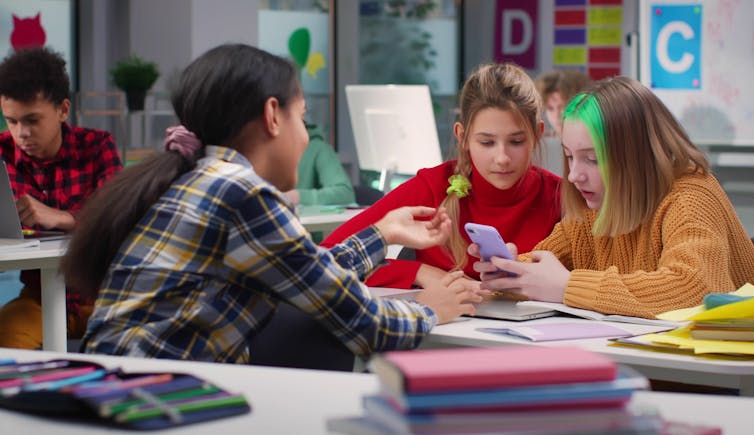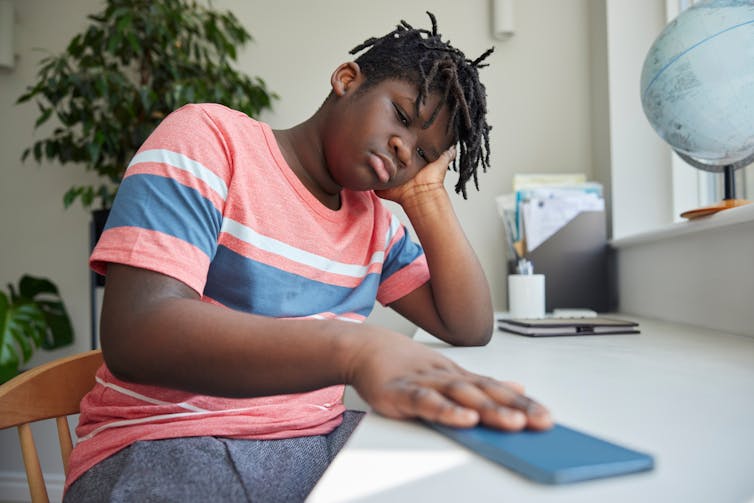Professor John McAlaney, Dr Emily Arden-Close and Dr Sarah Hodge write for The Conversation about the challenges and opportunities of using technology to support safer online gambling…
Technology can play a vital role in limiting online gambling – here’s how

Wpadington / Shutterstock
John McAlaney, Bournemouth University; Emily Arden-Close, Bournemouth University, and Sarah Hodge, Bournemouth University
More than a quarter of people in the UK gamble online at least once every four weeks. And 1%–2% of UK adults demonstrate moderate-to-high risk levels of gambling-related harms.
The substantive and striking changes that the rise of online gambling have introduced are acknowledged by the UK government’s recently published plans to change the law in this area.
Through smartphones or other internet-enabled devices, people can gamble online anywhere, at any time. Gambling online also often allows those experiencing gambling-related harm to more easily hide this from those around them.
The reach of online gambling by operators, and gambling overall, is further enhanced by online promotion using social media. In an analysis of Twitter posts by several UK gambling operators, we found that over 80% of tweets related to sports, but less than 11% of tweets related to responsible gambling.
Greater use of social media for responsible gambling messages would increase the impact of responsible gambling strategies. It would also enable more personalised targeting of this messaging to groups who may be at higher risk of harms, such as members of the LGBTQ+ community, who report a higher number of life stressors.
Loot boxes
There is also the increasing phenomenon of merging online gambling and other activities, notably loot boxes – which contain random game items that may or may not be desirable or valuable – in video games. These might allow the player to buy better weapons or armour for use in their game, or customise a player’s avatar. Players can purchase loot boxes in games, with either in-game or real-world currency.
In our research, we found that video game players perceive loot boxes to be a form of gambling, despite attempts by the video game industry to re-brand them with a less descriptive name, such as “surprise mechanics”.
From social psychology research, we know that how we behave and the attitudes we hold are strongly influenced by what we perceive to be the norm. Also, there are overlaps in the harms experienced with loot boxes, both in our research and media reports of issues that would be typically seen in gambling difficulties, such as overspending. Based on this, it seems likely that engaging with loot boxes will prime children and young adults towards becoming involved in gambling.
As has been noted by the Young Gamers and Gamblers Education trust (YGAM), awareness raising and training are needed. The concern about loot boxes is so great that they have been banned in Belgium, albeit with an acknowledgment that the ban will be difficult to enforce.
Responsible gambling tools and messages
The technologies that create the risks and challenges of online gambling can also be used to prevent and reduce harms. Various techniques – known in the industry as responsible gambling tools – are already available from operators to help players take control of their gambling. These include deposit limits and self-exclusion, where users can ask to be denied access.
However, uptake of these tools is low, and impact relies upon people recognising that they are at risk and being motivated to engage with these tools. So we welcome the suggestion in the government’s new white paper around making deposit limits mandatory, which is consistent with the views of people who have experienced problem gambling.
Our Gambling Research Group has explored how technology can be used to further prevent and reduce harms, including how players respond to personalised, targeted responsible gambling messaging based on social norms and goal setting.
This ability to receive immediate feedback regarding a harm prevention strategy from the target population is relatively new in psychology, and potentially very powerful. So including people with real experience of gambling problems in the co-creation of responsible gambling messages will result in more effective strategies.
The proposals included in the white paper would utilise some of the opportunities afforded by online technologies. For example, the use of affordability checks facilitated through credit reference agencies would likely reduce some of the harms associated with online gambling.
Similarly, online data-sharing on high-risk customers is a positive step, as many individuals engaging in problematic gambling report chasing losses until their money runs out.
Safer by design
We also welcome the proposed limit on online slots, which brings it in line with the 2019 reduction in stake in fixed-odds betting terminals, and the proposal to make online games safer by design. Our research has shown that individuals who are new to gambling are less aware of persuasive design techniques and thus potentially at greater risk from them.
Similarly, addressing gaps in legislation to ensure under-18s cannot gamble online may help prevent young people from developing problematic gambling behaviour later on. However, this impact may be limited by the UK government’s response in 2022 that no further legislation is planned to regulate loot boxes. Currently, little is known about the impact of gambling-related harms on children aged under 18.
It also cannot be underestimated how skilled gambling-addicted people are at finding a way around any restrictions. The white paper recognises the risks on unregulated gambling in online black markets, and calls for preventative action. But how this will be achieved remains to be seen.
The white paper’s new statutory levy is also a positive step that contributes to funding and the transparency of funding sources for quality gambling research, education and treatment.
While most people gamble online safely and responsibly, those who develop problems can experience severe effects. These negative consequences are not limited to the individual but can also affect those around them, including family, friends and work colleagues.
As technology continues evolving, it is vital that we continue to be mindful of the unique risks and opportunities that arise in online gambling to prevent people from being harmed.![]()
John McAlaney, Professor in Psychology, Bournemouth University; Emily Arden-Close, Principal Academic in Psychology, Bournemouth University, and Sarah Hodge, Lecturer in Psychology and Cyberpsychology, Bournemouth University
This article is republished from The Conversation under a Creative Commons license. Read the original article.














 Beyond Academia: Exploring Career Options for Early Career Researchers – Online Workshop
Beyond Academia: Exploring Career Options for Early Career Researchers – Online Workshop UKCGE Recognised Research Supervision Programme: Deadline Approaching
UKCGE Recognised Research Supervision Programme: Deadline Approaching SPROUT: From Sustainable Research to Sustainable Research Lives
SPROUT: From Sustainable Research to Sustainable Research Lives BRIAN upgrade and new look
BRIAN upgrade and new look Seeing the fruits of your labour in Bangladesh
Seeing the fruits of your labour in Bangladesh ECR Funding Open Call: Research Culture & Community Grant – Apply now
ECR Funding Open Call: Research Culture & Community Grant – Apply now ECR Funding Open Call: Research Culture & Community Grant – Application Deadline Friday 12 December
ECR Funding Open Call: Research Culture & Community Grant – Application Deadline Friday 12 December MSCA Postdoctoral Fellowships 2025 Call
MSCA Postdoctoral Fellowships 2025 Call ERC Advanced Grant 2025 Webinar
ERC Advanced Grant 2025 Webinar Update on UKRO services
Update on UKRO services European research project exploring use of ‘virtual twins’ to better manage metabolic associated fatty liver disease
European research project exploring use of ‘virtual twins’ to better manage metabolic associated fatty liver disease